Posted on May 27th, 2010 by Jaimie Schock
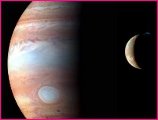 NASA is launching a new robotic mission to Jupiter in 2011. Classrooms are invited to join NASA/JPL engineer Tracy Drain as she discusses why NASA is sending the Juno spacecraft to Jupiter, how it will get there, and what it will study. The conversation will be geared to students in grades 6 through 8. The live web chat on June 3, 2010, at 1:00 p.m. Eastern/10 a.m. Pacific, can be watched online.
NASA is launching a new robotic mission to Jupiter in 2011. Classrooms are invited to join NASA/JPL engineer Tracy Drain as she discusses why NASA is sending the Juno spacecraft to Jupiter, how it will get there, and what it will study. The conversation will be geared to students in grades 6 through 8. The live web chat on June 3, 2010, at 1:00 p.m. Eastern/10 a.m. Pacific, can be watched online.
Read More
Filed under: Grades 6-8, K-12 Outreach Programs | Comments Off on Event: Mission to Jupiter Live Chat
Tags: Aeronautics, Aerospace, Grades 6-8, Live Web Chat, NASA
Posted on May 25th, 2010 by ASEE
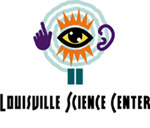
The AT&T Virtual Science Challenge is a multimedia contest for Kentucky students entering grades 5 through 10 who want a fun, non-traditional way to showcase their ideas. The contest provides an opportunity to effectively communicate creative solutions to science challenges through interactive, web-based projects. It encourages the development of science, math, engineering, and technology skills as students work individually or in teams to tackle unconventional science challenges and post their solutions online. Prizes: include a $1,000 Grand Prize, as well as IMAX theatre tickets and memberships to the Louisville Science Center. Entry Deadline: June 15, 2010.
Read More
Filed under: Grades 6-8, Grades 9-12, Grades K-5, K-12 Outreach Programs | Comments Off on Contest: Virtual Science Challenge
Tags: Contest, Grades 5-10
Posted on May 25th, 2010 by ASEE
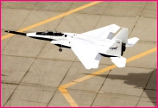 NASA’s Virtual Skies website provides an engaging yet informal way to present aviation topics to high school and academically advanced middle school students. The Aeronautics, Navigation, Weather, Air Traffic Management, Communications, Airport Design modules involve students in decision-making and collaborative skills using principles of algebra, geometry and calculus. Each section includes on-line activities complemented by downloadable print materials that can be used in the classroom to supplement the geography, mathematics, and science concepts.
NASA’s Virtual Skies website provides an engaging yet informal way to present aviation topics to high school and academically advanced middle school students. The Aeronautics, Navigation, Weather, Air Traffic Management, Communications, Airport Design modules involve students in decision-making and collaborative skills using principles of algebra, geometry and calculus. Each section includes on-line activities complemented by downloadable print materials that can be used in the classroom to supplement the geography, mathematics, and science concepts.
Read More
Filed under: Web Resources | Comments Off on Website: NASA’s Virtual Skies
Tags: Aeronautics, Aviation, Grades 6-8, Grades 9-12, Lesson Plans, NASA
Posted on May 24th, 2010 by ASEE
 Student teams use the engineering design process to create a useful product of their choice out of recyclable items and “trash.” The class is given a “landfill” of reusable items and allowed a limited amount of bonding materials. The activity addresses the importance of reuse and encourages students to look at ways they can reuse items they would normally throw away. Students are further prompted to consider the problems with growing landfills, and efforts by engineers and others to reduce pollution, emissions, and trash production.
Student teams use the engineering design process to create a useful product of their choice out of recyclable items and “trash.” The class is given a “landfill” of reusable items and allowed a limited amount of bonding materials. The activity addresses the importance of reuse and encourages students to look at ways they can reuse items they would normally throw away. Students are further prompted to consider the problems with growing landfills, and efforts by engineers and others to reduce pollution, emissions, and trash production.
Read More
Filed under: Grades 6-8, Lesson Plans | 1 Comment »
Tags: Engineering Design Process, Environmental Engineering, Environmental science, Grades 6-8, Recycling, Trash
Posted on May 24th, 2010 by ASEE
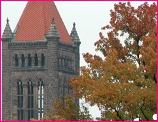 The MIST Teacher Workshop, July 28-30, 2010, introduces high school teachers to the structure and teaching strategies used in the Merit Program at the University of Illinois at Urbana-Champaign. The main goal is to help teachers feel confident in implementing this new method in their own classrooms and to introduce you to other teachers in your subject area to create a community of support. The majority of the workshop time will be devoted to experiencing the Merit teaching style and giving teachers the opportunity to develop materials they can take back to their own institutions. Stipend: $200, housing, food, and travel allowance. No new information provided for 2011.
The MIST Teacher Workshop, July 28-30, 2010, introduces high school teachers to the structure and teaching strategies used in the Merit Program at the University of Illinois at Urbana-Champaign. The main goal is to help teachers feel confident in implementing this new method in their own classrooms and to introduce you to other teachers in your subject area to create a community of support. The majority of the workshop time will be devoted to experiencing the Merit teaching style and giving teachers the opportunity to develop materials they can take back to their own institutions. Stipend: $200, housing, food, and travel allowance. No new information provided for 2011.
Read More
Filed under: K-12 Outreach Programs | Comments Off on Teachers Summer: MIST Workshop at U. Illinois, July 28-30
Tags: Biology, Chemistry, Math teachers, Programs for Teachers, Summer Programs (Teachers)
Posted on May 24th, 2010 by ASEE
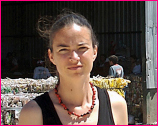 From helping impoverished trash workers in Argentina to transforming the way Canadian engineering students learn, Caroline Baillie has been a tireless champion of fostering social justice through engineering, challenging her colleagues and students to make ethics a core concern in their work.
From helping impoverished trash workers in Argentina to transforming the way Canadian engineering students learn, Caroline Baillie has been a tireless champion of fostering social justice through engineering, challenging her colleagues and students to make ethics a core concern in their work.
Read More
Filed under: Special Features | Comments Off on Feature: Warrior Against Poverty
Tags: Recycling, Research on Learning, Trash
Posted on May 24th, 2010 by ASEE
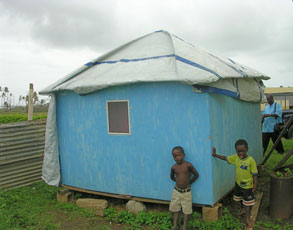
The Cooper Hewitt Museum’s online exhibit, “Design for the Other 90%,” highlights the efforts of engineers and others from all over the globe to devise cost-effective ways to increase access to food and water, energy, education, healthcare, revenue-generating activities, and affordable transportation for those who most need them. The Website serves as an excellent resource for teachers and students, and links to several related lesson plans and a teacher forum. A free traveling exhibit is visiting Washington, D.C. through September 6, 2010 at the National Geographic.
Read More
Filed under: Web Resources | Comments Off on Website and Exhibit: The Other 90%
Tags: Exhibition, Humanitarian efforts, Web Resources
 NASA is launching a new robotic mission to Jupiter in 2011. Classrooms are invited to join NASA/JPL engineer Tracy Drain as she discusses why NASA is sending the Juno spacecraft to Jupiter, how it will get there, and what it will study. The conversation will be geared to students in grades 6 through 8. The live web chat on June 3, 2010, at 1:00 p.m. Eastern/10 a.m. Pacific, can be watched online.
NASA is launching a new robotic mission to Jupiter in 2011. Classrooms are invited to join NASA/JPL engineer Tracy Drain as she discusses why NASA is sending the Juno spacecraft to Jupiter, how it will get there, and what it will study. The conversation will be geared to students in grades 6 through 8. The live web chat on June 3, 2010, at 1:00 p.m. Eastern/10 a.m. Pacific, can be watched online.









 NASA’s Virtual Skies website provides an engaging yet informal way to present aviation topics to high school and academically advanced middle school students. The Aeronautics, Navigation, Weather, Air Traffic Management, Communications, Airport Design modules involve students in decision-making and collaborative skills using principles of algebra, geometry and calculus. Each section includes on-line activities complemented by downloadable print materials that can be used in the classroom to supplement the geography, mathematics, and science concepts.
NASA’s Virtual Skies website provides an engaging yet informal way to present aviation topics to high school and academically advanced middle school students. The Aeronautics, Navigation, Weather, Air Traffic Management, Communications, Airport Design modules involve students in decision-making and collaborative skills using principles of algebra, geometry and calculus. Each section includes on-line activities complemented by downloadable print materials that can be used in the classroom to supplement the geography, mathematics, and science concepts. Student teams use the engineering design process to create a useful product of their choice out of recyclable items and “trash.” The class is given a “landfill” of reusable items and allowed a limited amount of bonding materials. The activity addresses the importance of reuse and encourages students to look at ways they can reuse items they would normally throw away. Students are further prompted to consider the problems with growing landfills, and efforts by engineers and others to reduce pollution, emissions, and trash production.
Student teams use the engineering design process to create a useful product of their choice out of recyclable items and “trash.” The class is given a “landfill” of reusable items and allowed a limited amount of bonding materials. The activity addresses the importance of reuse and encourages students to look at ways they can reuse items they would normally throw away. Students are further prompted to consider the problems with growing landfills, and efforts by engineers and others to reduce pollution, emissions, and trash production. The MIST Teacher Workshop, July 28-30, 2010, introduces high school teachers to the structure and teaching strategies used in the Merit Program at the University of Illinois at Urbana-Champaign. The main goal is to help teachers feel confident in implementing this new method in their own classrooms and to introduce you to other teachers in your subject area to create a community of support. The majority of the workshop time will be devoted to experiencing the Merit teaching style and giving teachers the opportunity to develop materials they can take back to their own institutions. Stipend: $200, housing, food, and travel allowance. No new information provided for 2011.
The MIST Teacher Workshop, July 28-30, 2010, introduces high school teachers to the structure and teaching strategies used in the Merit Program at the University of Illinois at Urbana-Champaign. The main goal is to help teachers feel confident in implementing this new method in their own classrooms and to introduce you to other teachers in your subject area to create a community of support. The majority of the workshop time will be devoted to experiencing the Merit teaching style and giving teachers the opportunity to develop materials they can take back to their own institutions. Stipend: $200, housing, food, and travel allowance. No new information provided for 2011. From helping impoverished trash workers in Argentina to transforming the way Canadian engineering students learn, Caroline Baillie has been a tireless champion of fostering social justice through engineering, challenging her colleagues and students to make ethics a core concern in their work.
From helping impoverished trash workers in Argentina to transforming the way Canadian engineering students learn, Caroline Baillie has been a tireless champion of fostering social justice through engineering, challenging her colleagues and students to make ethics a core concern in their work.
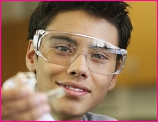 Project Lead the Way (PLTW), a national, highly-regarded engineering program for high schools, was recently given a status upgrade by a suburban Chicago school district. Henceforth, all PLTW courses within Oswego’s two high schools will be given equal weight with Advanced Placement (AP) courses. Oswego schools adopted the PLTW program six years ago, but the engineering courses only had the status of any other elective.
Project Lead the Way (PLTW), a national, highly-regarded engineering program for high schools, was recently given a status upgrade by a suburban Chicago school district. Henceforth, all PLTW courses within Oswego’s two high schools will be given equal weight with Advanced Placement (AP) courses. Oswego schools adopted the PLTW program six years ago, but the engineering courses only had the status of any other elective.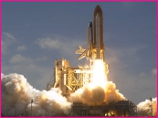 Chuck Lostroscio, a NASA software engineer, has reconfigured the simulation software NASA used to train Space Shuttle astronauts and created a computer game-like tool to help students learn how they might one day apply their math, science and engineering lessons. It’s called the Kennedy Launch Academy Simulation System, or KLASS, and it requires students to play a mission control engineer for a simulated shuttle launch.
Chuck Lostroscio, a NASA software engineer, has reconfigured the simulation software NASA used to train Space Shuttle astronauts and created a computer game-like tool to help students learn how they might one day apply their math, science and engineering lessons. It’s called the Kennedy Launch Academy Simulation System, or KLASS, and it requires students to play a mission control engineer for a simulated shuttle launch.